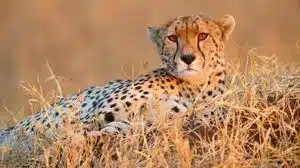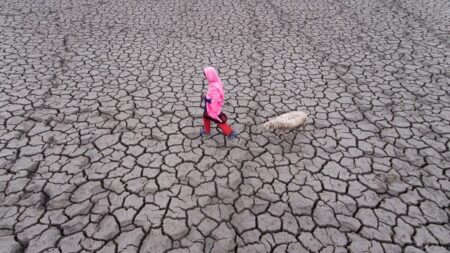Yesterday, one of the Cheetahs moved from South Africa under Project Cheetah died in Kuno National Park, Madhya Pradesh. Uday was a 6 year old male cheetah who arrived in India in February 2024. Having lost Sasha due to kidney ailment on 27th March 2022, who was relocated from Namibia last September, we have now lost another within a month. After an autopsy reported Uday’s death due to cardiopulmonary failure, he was cremated at Kuno.
(Image source- DNA India)
According to reports, Uday displayed peculiar behaviour when a team of professionals went to conduct their daily rounds of examination. He was reportedly sitting in a torpid state with his head sunk in tiredness. Uday became wary as the team drew near, and he began to move unsteadily. The specialists became concerned and notified the veterinarians right away.
After examining him, the physicians determined that he requires immediate medical care. Permission to tranquillise Uday was immediately given by the Chief Conservator of Forests. He took his final breath at 4 p.m. despite the physicians’ best efforts to save him.
(Image source- Hindustan Times)
Manager of the Metapopulation Cheetah Project, Vincent Van De Merwe says, “one cannot expect wild Cheetahs to flourish if you take them from wild, natural, free ranging conditions and throw them into cages for 10 months (8% of their lives)”.
Earlier, when Sasha died, scientists claimed that Kuno, which at the time was home to 20 cheetahs, was unsuitable as a host for such a big number due to the scarcity of prey. Since Mukundra Tiger Reserve is well-equipped, the Rajasthan Government volunteered to host some animals there, yet the wildlife biologist Yadvendradev Jhala claimed in an interview that political factors had stopped this from happening.
Currently, there are only 20 chital, the cheetah’s primary prey, per square kilometre in the KNP, down significantly from the almost 60 chital per square kilometre that were spotted there in 2014, and this can only sustain up to 15 animals, according to Dr. Jhala.
He continued, saying that the lack of adequate prey in KNP is a worrying issue, and that the government should take steps like prey augmentation.
Cheetah Reintroduction Action Plan-
The Cheetah, the only extinct big animal in Independent India, is the target of a project. 50 cheetahs will be introduced as part of this programme at various national parks in the next five years.
The first phase of the Action Plan, which involved the relocation of 8 cheetahs from Namibia in September 2022, was made possible by the Wildlife Institute of India and the Wildlife Trust of India. The second phase, which took place in February of this year, saw the release of 12 cheetahs brought from South Africa to Kuno National Park in Madhya Pradesh.
Due to overhunting and habitat destruction, the cheetah is the only big carnivore that has been entirely eradicated from India. The nation’s readiness to reintroduce the cheetah is highlighted in the Action Plan. Cheetah conservation is extremely important to the national conservation ethic and culture. The word “cheetah” (Acinonyx Jubatus Venaticus) itself is Sanskrit in origin and means “the spotted one.”













